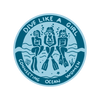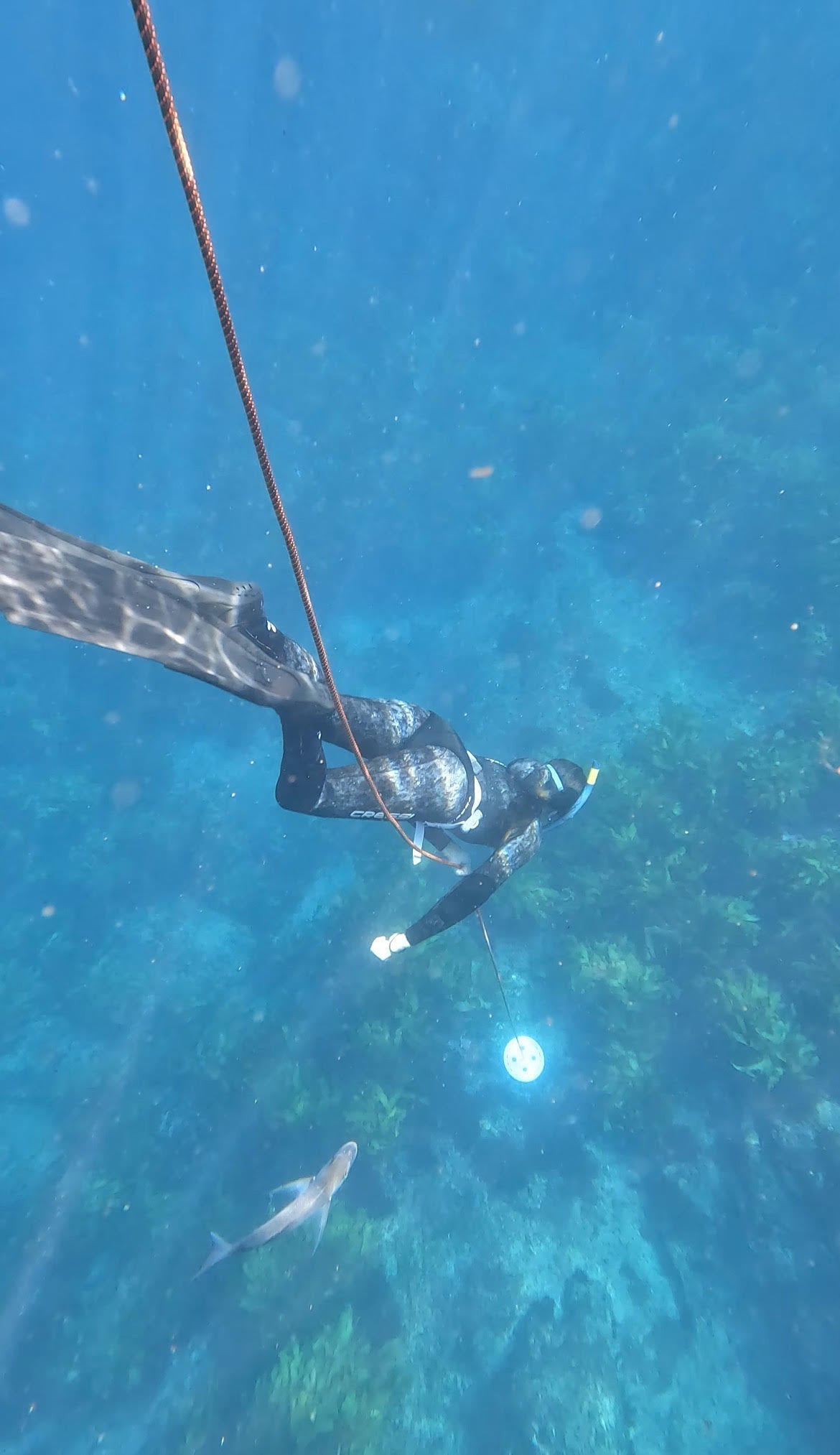Mauri Ora, Tai Pari: Diving Into Identity and Inner Strength
Reflections from a Wāhine Diving Empowerment Grant Journey
By Amina Moton (2025 DLGNZ Empowerment Grant Recipient)
Mauri ora, tai pari. This whakataukī, or proverb, likens the ebb and flow of the ocean tide to the constant shifts in our wellbeing. The tide’s pull is natural, and the ocean doesn’t resist. She moves with it, in her own rhythm, graceful yet powerful, serene yet fierce. The constant shifts between stillness and intensity mirror our own mauri, or natural life force, which ebbs and flows in harmony with the world around us.
I have always felt a constant pull to the moana. My ancestors were sea-faring people; on my mother’s side I hail from both Tainui and Ngā Toki Matawhaorua waka, and on my fathers from the coastline of Bahr-e-Arab, the Arabian sea. For generations, both sides of my whānau have had a deep relationship with the ocean— relying on it for sustenance, guidance, and protection. Overtime, it became part of our identity, and perhaps this is the reason I’ve felt drawn to the ocean in ways I couldn’t fully understand until recently. Freediving, much like the rhythms of the ocean, offers a way to explore that pull, diving into the depths of both the moana, and ourselves.
Thanks to the Empowerment Grant from Dive Like a Girl NZ, I had the chance to explore these whakapapa connections more deeply, through the embodied experience of freediving. I took part in a two-day freediving course with Freedive Aotearoa, a wahine-founded, family-owned organisation that supports beginner divers into entering the underwater world.
Gearing up for our dive at Tawhiti Rahi/Aorangi Islands
I didn’t grow up in a family that were into boats or did water sports. Although we were always at the beach, and I have found memories of collecting shellfish closer to shore, going our further always seemed like something only other people could afford to do. We’d get our “proper” kaimoana fix from the males in our extended whānau, my uncles who had mates with boats, or my cousins who lived on the coast. I’d never imagined, that as an adult I would start “freediving” myself, at first to collect my own kai, but eventually as a protective factor for my wairua, my spiritual essence.
Prior to the course, my freediving skills were next to none. That’s not to say I hadn’t been trying in a more casual way. I’d spent the last few summers in the water, collecting kaimoana close to the surface—kina, kūtai, and pāua. My set-up was humble but familiar. I’d take with me a free knife from my local fisheries office, a reusable Pak’nSave bag for my harvest, and a karakia to Tangaroa and Hinemoana, asking them to keep me safe in their domain.
My daughter and I exploring rock-pools in Pōneke
What I wasn’t equipped with was technique. Although a confident swimmer, my breath hold was terrible. I knew nothing about recovery breaths—instead I’d dive straight back in after surfacing. I wasn’t going any deeper than 3 to 4 metres, and I knew very little about equalising. I hadn’t invested in any dive gear, dive shops overwhelmed me, and the price point was high so I just made do.
The course through Freedive Aotearoa turned that around. I learned proper techniques and skills that helped me dive deeper, and more efficiently. A key component was breathing. Prior to the course, I had underestimated just how important proper breathing techniques are. Learning how to warm up my diaphragm and intercostal muscles, how to tidal-breathe, and how to take that final breath properly was a game-changer in significantly increasing my breath-hold. Recovery breathing meant I no longer tired myself out in the water like I used to.
As a beginner, I had overlooked how vital breathwork truly is, not just for diving, but for regulating our emotions and thoughts. Tihei mauriora is a common expression in Te Ao Māori. It acknowledges the first breath of life, taken by the first human being—a woman. Although breathing is something we do instinctively, learning to control it in freediving was eye-opening. Being intentional and mindful with each breath enhanced my diving, but it also helped me tune into my own capabilities. It was undeniably an empowering experience.
Being in the waters around Tawhiti Rahi and Aorangi, the Poor Knights Islands, was nothing short of breathtaking. It was the warmest, calmest ocean water I’d ever dived in. Its tropical currents bring in marine life from across the Pacific—colourful fish, eels, manta rays, and even turtles! Beneath the surface, vast underwater caves, towering arches, and winding tunnels made it an unforgettable place of exploration and adventure.
Underwater at the Poor Knights: Dive! Tutukaka (https://diving.co.nz/)
With the remarkable surroundings, it was a little hard to focus on the course work at first. But I was determined to reach the goal I’d set for myself that day: to dive down to 10 metres. Although I now had my breath technique under control, I was struggling with the next key step—equalising. With lots of support and guidance from the dive instructors, I focused intently on improving my technique.
What finally got me to the bottom was the sight of huge, long-spined kina. Unlike the common New Zealand kina I was used to collecting, these tropical ones were massive—some looked the size of my head! My curiosity got the better of me, and I needed to see them up close. I envisioned myself as one of my tūpuna from the warm waters of Te Tai Tokerau, a strong wahine huntress gathering kai for her whānau. With that mindset, and the encouragement of the instructors, I passed my 10-metre goal and touched the ocean floor.
The pride and empowerment I felt in that moment were profound, and it was a lasting reminder of what I was capable of.
Sacha and Lily, the two wāhine who facilitated our course, were truly incredible. Britney from DLGNZ was equally inspiring, offering encouragement every step of the way. They were all exceptionally patient and shared a wealth of knowledge and support. Listening to their stories, about how and why they got into freediving, was deeply inspiring. Freediving is a male-dominated space, so having the support of wāhine who are leading the way in communities like Freedive Aotearoa and DLGNZ filled me with immense gratitude.
What has been most rewarding as a beginner wahine diver has been the newfound sense of identity and empowerment. I’ve caught glimpses of this before; when I collected my first harvest of pāua in Pōneke with my sister, and again when I’ve taken my daughter out to collect kina in her ancestral district of Taranaki. With the support of this grant, I’ve been able to deepen my cultural identity and resilience, pushing my limits and expanding my capabilities in the ocean. Gaining access to the right gear, skills, and training has been an experience I am truly grateful for. I now feel confident in continuing my freediving journey, investing in proper equipment, and becoming part of the wider wāhine diving community in Aotearoa.
Reconnecting with the moana has done wonders for my hauora, my wellbeing. As a source of healing and identity, I believe the ocean should be accessible to all. For wāhine especially, the moana is not just a place of recreation, but can be a space of healing and empowerment. Much like many of our ancestors, who learned to read the ocean and move with its ebb and flow, freediving offers a powerful metaphor for navigating our own emotional landscapes. Just as we dive into the depths of the ocean, we too can dive into the depths of our inner selves, embracing stillness and confronting challenges with newfound resilience and empowerment. Mauri ora, tai pari.


0 comments